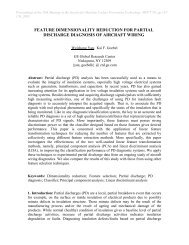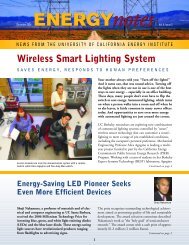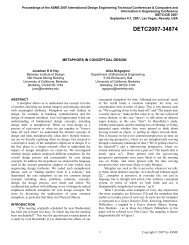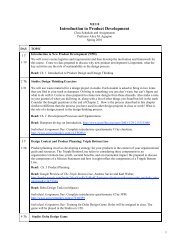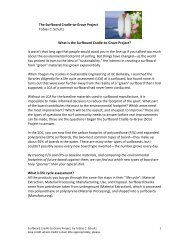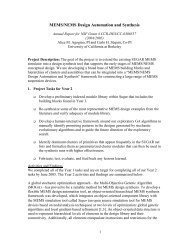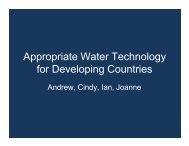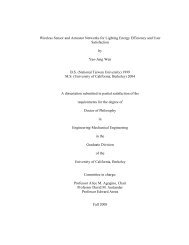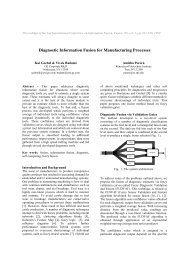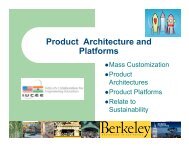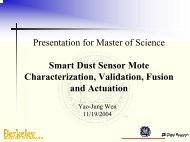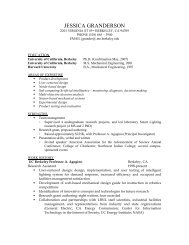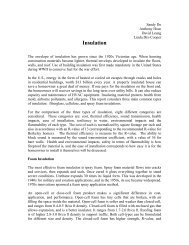Syllabus/Schedule - Berkeley Expert Systems Technology Lab
Syllabus/Schedule - Berkeley Expert Systems Technology Lab
Syllabus/Schedule - Berkeley Expert Systems Technology Lab
You also want an ePaper? Increase the reach of your titles
YUMPU automatically turns print PDFs into web optimized ePapers that Google loves.
20 W 4/28 DfX: Design for Manufacturing<br />
Design for manufacturing is one of the many “design fors” that a product development team<br />
must undertake. In this class session we’ll talk about the various “design for x” activities,<br />
including manufacturing. Consider thought questions 1 and 2 at the end of Chapter 11.<br />
We’ll disassemble and reassemble a product in class in order to evaluate its design-forassembly<br />
merits.<br />
Read Ch. 11: Design for Manufacturing<br />
21 M 5/3 DfX: Design for Environment<br />
In the first reading (Cradle to Grave), click through each of the six stages and read the first<br />
page that pops up. Following the links on each page is encouraged but entirely optional,<br />
except for the three additional links under the "emissions" page, which you should follow.<br />
What does designing products for environmental soundness entail? How might you make<br />
tradeoffs among cost, quality, features and environmental soundness when designing a<br />
product? What is sustainable design? What is the difference between the the "cradle to<br />
grave" perspective and the"cradle to cradle" alternative? How might you redesign or<br />
manufacture your product with this perspective in mind? We will also review the data<br />
collected through the Black Cloud sensor that should have been installed earlier.<br />
Read: Cradle to Grave – How Products Impact Natural <strong>Systems</strong>”<br />
Read: "The Cradle to Cradle Alternative"<br />
22 W 5/5 Life Cycle Analysis<br />
We will also hold a tutorial on using a Life Cycle Analysis software tool and have you apply<br />
it to your projects. Be sure to bring your computers to class.<br />
Read: EIO-LCA Tutorial, http://www.eiolca.net/tutorial-j/tut_1.html<br />
Read: EIO-LCA Tutorial<br />
23 M 5/10 Solid Modeling and Integration with FEM<br />
Guest lecturer Dennis Lieu will go over examples of how to integrate different forms of finite<br />
element modeling from your solid model. Bring examples from your class project to class<br />
that you would like to discuss in the lab.<br />
24 W 5/12 Solid Modeling and Optimal Design<br />
Guest lecturer Sara McMains will go over examples of how to integrate optimization with<br />
your solid model.<br />
Individual Assignment: Optimization exercise based on earlier solid modeling problem of<br />
March 1.<br />
25M 5/17 Product Development Entrepreneurship<br />
Bring in your questions about the intellectual property of your project. This would also be a<br />
good time to discuss possible funding opportunities. We may have a guest speaker from<br />
KAUST.<br />
Read Ch. 14: Patents and Intellectual Property<br />
26 W 5/19 Product Development Economics<br />
Bring in your questions about business models and financial modeling for your projtect.<br />
5/22-<br />
25<br />
Read Ch. 15: Product Development Economics<br />
Project deliverable: Draft business plan and financial model for your project.<br />
Final Exam week – Final Presentations/Tradeshow<br />
• Final Individual Deliverables: Turn in the journal you have been keeping throughout<br />
the semester. It will be returned at the beginning of the Spring semester. Complete the<br />
7




